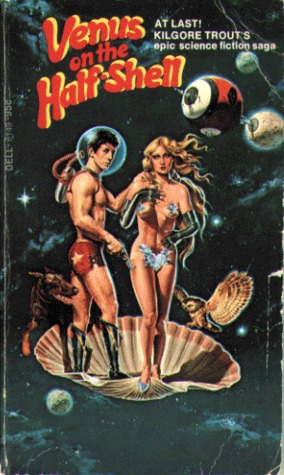There is a strong and enigmatic appeal to the human mind in the paradoxical and the self-referential. From Russian dolls, through novels within novels, to the more mind-endangering philosophical instances such as whether the set of non-self-membered sets belongs to itself,** we are drawn towards a range of cultural and mental phenomena that, as it were, double-back on themselves.
I am probably not a bear of sufficiently large brain to speculate usefully on the reasons for this strange attraction, but, if taxed, I might suggest it has something to do with the aesthetic and structural appeal of reflection and repetition, and if further pressed and supplied with spirituous liquor of sufficient strength and likewise volume, I may become pretentious enough to speculate upon how the nature of consciousness and the structure of the brain are linked to the matter. I don't think I'd believe myself in the morning, however.
The phenomenon was recently re-presented to my attention by reading Angela Thirkell's High Rising (see my blog review). That's three hyperlinks in a row - is there not a large, cuddly toy now? In this charming amuse-bouche of a novel, there is a great deal of writing going on, including serious historical biography, the main character's own light fiction (which sounds remarkably similar to the book we're reading) and her son's sudden outpouring of accidentally hilarious poetry, viz:
By marsh and mallow
Fern and glen.
By marsh and mallow,
Went they then.
By marsh and mallow
The moorhen
By marsh and mallow
Went she then.
By marsh and mallow
When, ah then,
A hunter sallow
Shot that moorhen.
By marsh and mallow
Fern and glen.
By marsh and mallow,
Ne'er again.
Writing in writing is used in many ways, of course, from such satire of precious teenage bathos to highly erudite pastiche, as in AS Byatt's Possession, wherein we can joyfully play 'spot the poet' as we skip through the pages. One example that has tireless appeal for me is Kurt Vonnegut's hapless ego Kilgore Trout, the hack science-fiction writer who shuffles, dishevelled in appearance and fortune, through many of the late, great author's novels. Vonnegut presents short summaries of Trout's writing to great comic and emotional effect, partly to satirise science fiction and people's attitudes to science fiction, and also undermining the whole notion that writing needs to have 'meaning' or 'secrets' picked out of it like nits from a scalp. As a former marginalised 'science-fiction writer' himself, Vonnegut is also taking a swipe at himself, in a clear case of having your cake, eating it, then deriding the whole notion of cake-eating as a legitimate endeavour. Vonnegut's terse summaries of Trout's work are always going to be more entertaining than the actual works would have been, had they really existed, which is part of the whole, very Vonnegutian, multi-layered joke:
'As for the story itself, it was entitled "The Dancing Fool." Like so many Trout stories, it was about a tragic failure to communicate. Here was the plot: A flying saucer creature named Zog arrived on Earth to explain how wars could be prevented and how cancer could be cured. He brought the information from Margo, a planet where the natives conversed by means of farts and tap dancing. Zog landed at night in Connecticut. He had no sooner touched down than he saw a house on fire. He rushed into the house, farting and tap dancing, warning the people about the terrible danger they were in. The head of the house brained Zog with a golfclub'.
This particular stream of self-reference took an even wilder course when a real science-fiction writer produced a full-length novel by Kilgore Trout, these being Philip José Farmer and Venus on the Half-Shell, respectively.
I shall leave you to hunt down your own second-hand copy of the only surviving Trout novel, and I haven't even mentioned At Swim-Two-Birds.
**if it doesn't, then it must, and vice-versa; this realisation apparently gave Bertrand Russell quite a turn.

ye sab daya hi parmeshwar ki .. mere dono bete adbhut riti se badte ja rhe hi .. Apna Showroom Baby's Cotton Panties/Bloomers/Underwear 12 Pieces 12-24 months or 1-2 Years panty for kids baby girls boys kachi
ReplyDeleteApna Showroom Baby Boys and Girl's Cotton Panties Bloomer Combo Multicolour, 6-12 Months for 1 Years 12 Pieces Attractive
Apna Showroom Baby Panties 0-6 Months for Girls or Baby Underwear Bloomer Panty or Undergarments Wear or Unisex Multi Fancy and Designer
hum shandar parenting kar rhe hi .. or dil se dhanywad parmeshwar ka UKPSC prelims mera qualified karwa diya .. hi